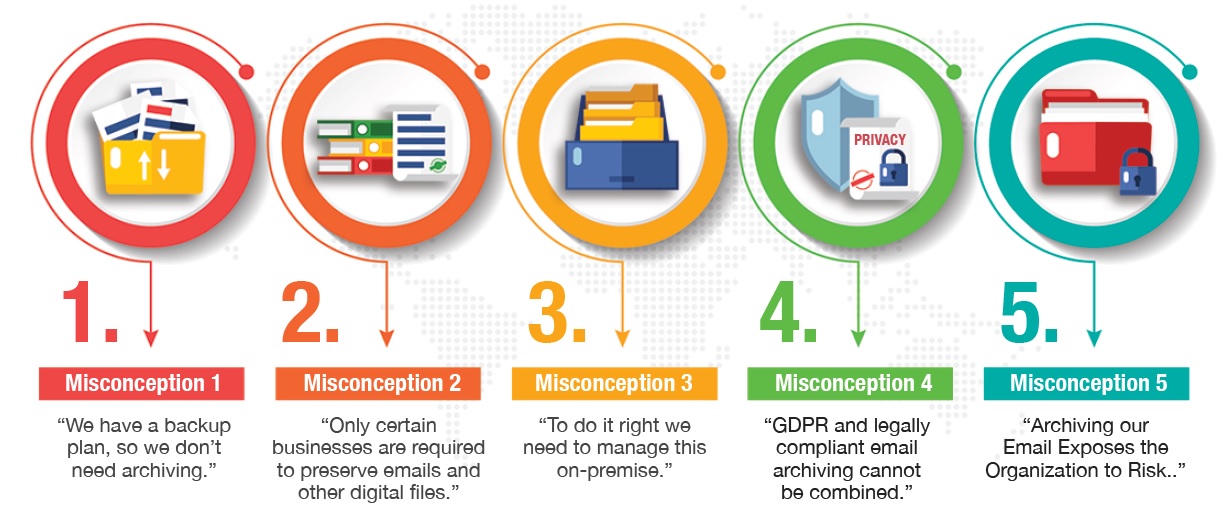From financial data to funny cat videos to document edits, the amount of info that flows through business email conversations is vast and touches every department in an organization.
Some organizations are unaware of the importance of archiving emails and having an email retention strategy. The lack of awareness around the importance of email retention and what can happen if there is no archiving system in place may be down to some common misconceptions about email archiving.

Misconception 1 - “We Have a Backup Plan, so we Don’t Need Archiving.”
“Backups are sufficient for archiving”. It’s easy to assume backups are sufficient, and most administrators repeat the notion that backups are all a corporation needs. Backups and archiving are entirely different strategies, but both are important for business continuity. Backups are designed to take a picture of your data at one point to restore it in case of catastrophic failure. Depending on business requirements, keeping backups for a long time may not be necessary. With archiving, however, files are kept for years depending on compliance and the corporate retention plan.
You might wonder why corporations need to keep emails. For example, email may need to be available for legal reasons. During legal proceedings, lawyers must search through data to support claims for plaintiffs or support defense claims for defendants. Archiving is designed to store email in a way compliant with legal requirements, but backups may not be adequate if the email is required for a court case. Email archives allow researchers to find data quickly rather than work through a directory of stored files in backup packages.
Aside from being a proactive legal measure, archiving also provides other benefits compared to backup. Take, for example, the ability to review company emails if the corporation ever suffers from a data breach. The information in archived email is far more accessible than in email that’s been backed up — finding a specific message is almost as easy as finding a message in your inbox. Email is archived with metadata, such as date and server path, that can provide valuable information years after the email was sent.
An archive is not the same as a backup! Backups are not designed for efficient searches of emails, and the content of backups can easily be changed or deleted. Litigation, due diligence, and common sense say there needs to be a data archive in addition to keeping data backups. To say that your data is stored in the cloud does not mean you have an archive, even if you store files in a cloud bucket. An archive is different from a backup. A backup can only restore a file in its entirety. An archive lets you restore and access only the items that you need.
For example, if you have a lawsuit over a contract from five years ago, it would be challenging to restore transactions with your defendant without erasing the current production accounting system, which is not an option. An email archive is a journal that lets you return closed accounting periods online without disrupting the production system. This means old data is stored in an archive format, not a native database backup format.
Did You Know?
search limits with ArcTitan
saving on email storage space
item export limit
emails sent and received daily by 2026
Misconception 2 - “Only Certain Businesses are Required to Preserve Emails and Digital Files.”
While you might think, “If we have a 90-day deletion policy, regulatory auditors and the courts will let us off the hook if we can’t produce data”. This isn’t always necessarily true. Deleting evidence and violating compliance regulations are much more costly than allowing data archives to back up data and make it available during legal proceedings.
t is true that some businesses have very stringent requirements about email retention, and many industries are affected by laws — such as Sarbanes-Oxley and HIPAA — that require specific data handling measures. But even businesses unaffected by industry-specific regulations could be legally required to produce old emails and electronic communications during litigation or incident response. Organizations can sometimes be under a misconception that if an industry is not regulated, you don’t need to archive.
For example, after a data breach, investigators perform incident response. Incident response is a process that identifies the vulnerability that caused the violation, the exploit used to obtain unauthorized access, the storage of evidence, and the investigation into the severity of the incident. A threat could persist for months before it’s caught, so investigators might need old data –including email messages—to pinpoint the severity of the security breach and the exploit used to obtain access.
With phishing threats prevalent in data breaches, email is necessary for litigation after a data breach. Legal cases today often involve e-discovery or court orders to produce emails and any other electronic information that might be relevant to claims. It’s not only necessary to keep emails for extended periods; they must also be available on demand without long delays. An email archiving solution stores messages in an easily searchable format to provide quick access to email archives. Archiving email doesn’t just offer help with litigation. It also helps with compliance audits so that an organization can avoid penalties and fines.
Another component in data archiving is a formal policy that follows a capture model, namely a retention policy. What happens if emails are court-ordered but are deleted due to no corporate retention policy? An effective retention policy could leave the company liable for evidence destruction. Aside from legal obligations, following compliance regulations and creating a retention policy that supports business continuity is essential.
According to the Federal Rules of Civil Procedures (FRCP), a business must describe how it stores its emails during pre-trial proceedings. Email messages and files must be produced on demand with their associated metadata.
A few highlights archiving solutions must provide:
- Needs to provide an audit trail of who accessed files and any actions taken on each email file.
- Must be safe from accidental deletions and overriding data.
- Must allow for convenient and easy access of records to legal counsel. Some email archiving solutions provide credentials to legal counsel to facilitate a rapid discovery process without compromising security.
An example of a highly regulated industry is financial services. The financial industry deals with people’s livelihoods and stores excessive data on every individual. Banks, for example, keep a consumer’s personally identifiable information (PII), bank account information, social security numbers, tax documents, and other information used for consumer loans. Financial institutions are significant targets for fraud and digital threats, mainly for the money and data they store. These threats make it critical for financial institutions to keep a long history of communication with consumers. Some banking institutions are under legal obligations from class action lawsuits, which can last several years before the courts finalize a resolution.
Email is vital to everyday business and communication in the financial services industry. Email makes it more convenient for consumers to work with their bank, but it also opens up banking institutions to potential fraud, social engineering, and phishing threats. Email plays a central role in transactions both within bank employee communications and external customers with customer service issues or electronic document sharing for loans and identification verification. Because email plays such an essential role in financial communications, emails are highly regulated. They must be archived and audited, and an audit trail must be kept in the event of litigation. A solution such as ArcTitan can help these organizations securely manage and archive their data while adhering to compliance requirements and local laws and regulations.
Not only does ArcTitan allow for compliance in email archiving, but it also protects organizations from cyberattacks such as Business Email Compromise (BEC). Attacks such as BEC can devastate businesses, including brand reputation damage, data loss, and theft, loss of customer trust compliance fines from penalties, and injection of malware such as ransomware or remote access trojans. Although not all industries are highly regulated, like financial services, email archiving is essential to a layered security approach in a cyberattack.
Misconception 3 – "To Do it Right, We Must Manage Archiving On-Premises."
There are a few different options if you’re considering an email archiving solution. In-house archiving involves purchasing software and hardware to be maintained on premises. There are some disadvantages to storing your email in-house. Email can chew up enormous amounts of storage, and in-house archiving requires skilled employees to maintain the software and servers. Duplicate data may need to be stored off-site for disaster recovery purposes.
Some email archiving solutions provide a hosted service where administrators can store files in the cloud instead of adding costly storage and resources to the local network environment. This option helps administrators avoid common problems inherent in an in-house solution but introduces some problems, primarily security issues.
Cloud-delivered email archiving services are becoming more viable and attractive for some due to scalability, which is essential since most organizations receive thousands of email messages daily. Enterprise organizations could send and receive millions of emails, all of which must be archived in case of a security incident. On-demand solutions are more cost-effective as they provide a predictable cost structure, and the risk of managing and expanding the archive system is shifted to the service provider. Because data is stored off-site in a cloud-based email archiving solution, the data center has distributed built-in disaster recovery features that provide data protection of archives with the option to recover them after a catastrophic error.
An additional benefit of email archiving is that keeping old emails on your server is unnecessary. Archiving solutions can be configured to delete original files after moving them to the new cloud storage location. This feature reduces the storage cost and frees up space on the local network. Deleting emails from the original server increases system performance. Cloud solutions often use parallel processing, making searching for massive datasets a breeze, and they generally provide encryption and multi-level security.
Misconception 4 - "GDPR and Legally Compliant Email Archiving Cannot be Combined."
The introduction of GDPR has forced organizations to consider their data governance processes, which is currently generating a renewed interest in email archiving and how organizations store their email data. ArcTitan is a cloud-based secure archive deployed on AWS (Amazon Web Services). AWS is a reliable platform compliant with GDPR for email retention, auditing, and all major regulatory standards. ArcTitan is compatible with all major mail servers and email services and will meet the most demanding clients' requirements.
Compliance with regulatory requirements is often a priority for most enterprise businesses, especially when violations could cost millions in fines. Although GDPR is a European standard, most enterprise businesses in the US strive to stay GDPR compliant to continue doing business with European Union countries. Firms in the US might not be as aware of all GDPR rules, but ArcTitan makes it easier to stay GDPR compliant without having a review of your system. When you work with ArcTitan, you can be assured that your enterprise email archiving system complies with US regulatory standards and GDPR.
Misconception 5: "Archiving our email exposes the organization to security risks."
Some companies believe archiving email is like keeping a “smoking gun.” They mistakenly believe that what isn't saved won’t hurt them. However, implementing short retention policies – typically 30 or 90 days – across the organization does not protect from the threat of litigation, nor does it allow the organization to meet compliance requirements. Even if an email is deleted from the corporate email servers, it's more than likely on the server of the person or people who received or were copied on the email. Short retention periods also increase the difficulty, complexity, and cost of responding to e-discovery requests.
Email archiving solutions save organizations from hefty compliance fines when they cannot produce email messages during an investigation. Should a data breach occur from phishing, for example, businesses need copies of these email messages during investigations and potential future litigation. Not only is an archiving solution beneficial for compliance, but it can speed up incident response. For advanced persistent threats, it might be necessary to pinpoint the original point of entry using email archives.
Key Differences between Backups and Archives
Many misconceptions surrounding email archives are that businesses think the two strategies –backups and archives—are the same. Backups and archives are different file strategies, but both help with business continuity, disaster recovery, and incident response. It would be best if you had both strategies to conform to disaster recovery and stay compliant with the latest regulatory standards. Still, it’s essential to understand the difference to know how to manage files.
Backups are your immediate disaster recovery files. Should a user accidentally delete a file, a backup can be used to restore it without much overhead. Some backup systems allow users to keep a copy of their files and restore them when necessary. Most compliant regulations require organizations to keep a backup of their files for business continuity and disaster recovery. Usually, backups have a 30-to-90-day retention period, and they are readily available for quick recovery. Essentially, backups are essential for quickly recovering lost or corrupted files.
File archives are similar to backups in that they are a copy of critical files. Usually, archives are made from documents and email messages that must be retained for years in case of litigation or audits into an incident. Instead of taking copies of files and leaving the originals in their storage location, an archive system will transfer them to a new location and free up space on your local network.
Archiving systems should let administrators set a retention policy for years if necessary. Always check with compliance regulations before determining the amount of time to retain archived data. Archives are stored securely, mainly when you use a solution like ArcTitan. ArcTitan secures stored files and indexes them so that users can perform a search. During litigation, e-discovery, incident response, compliance audits, and investigations, the ArcTitan system makes searches much quicker than standard backups.
ArcTitan Keeps You Compliant and Preserves Business Continuity
An e-discovery solution is critical for any business, but companies often fear the cost of additional storage to maintain backups and archived files. A cloud-based solution reduces the storage cost, making scalability more affordable and convenient. Using a service provider, you can set up ArcTitan without expensive hardware installation or adding more overhead to your administrators. All updates and platform support are provided by ArcTitan developers.
Phishing and email-based threats are more common in data breaches than years ago, so investigations require archives to search for evidence and a source of the initial exploit. Although email archives are an additional technology expense, they can save your business millions after a data breach in compliance fines and investigations. Not only can email archives save money during incident response and litigation, but they can also be helpful during disaster recovery.
Small, medium, and enterprise businesses can take advantage of ArcTitan. Our customer service is always ready to help support any questions you have during the deployment and configuration of the cloud-based archiving solution.
Sign up for a free trial to learn more about what ArcTitan can do for your business.

Jennifer Marsh
- DATA PROTECTION
- EMAIL ARCHIVING
- COMPLIANCE
Talk to our Team today


